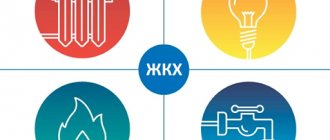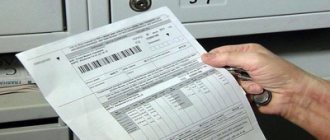Art. 155 of the Housing Code of Russia, as recently amended, regulates the most important legal relations that affect absolutely all people living in Russia. The fact is that this article defines in detail how we should all pay for utilities, what period of payment for utilities is established by law, and how the issue of payment for water supply, electricity and other similar services should be resolved in the relationship between the landlord and his employer.
Default deadline for payment of utilities or housing
In paragraph one of the above article, the law states that utilities must be paid before the 10th day of the month that follows the previous month for which payment must be made. At the same time, legal norms leave people some room for flexible maneuver, since the payment deadline can be changed and postponed if the HOA participants decide on this at a general meeting or the residents of a high-rise building make such changes to the agreement on the management of their apartment building.
Why did the creators of the Housing Code of the Russian Federation establish precisely these provisions of the law concerning the exact determination of the payment period? In the comments to this paragraph of the code, many authors write that the reason, most likely, is that in reality, and not on paper, quite often people try by all means to avoid additional costs, including for utilities.
Therefore, the legislator considered it necessary to carefully regulate both the deadline and the procedure for paying for utility services in order to eliminate any kind of uncertainty in this matter and, therefore, avoid the emergence of numerous disputes that would place an additional burden on the judiciary. At the same time, legislators provide citizens with the opportunity to choose and change the payment date, using one of the methods provided by the law to do this, without constraining them to one predetermined date.
We are sure that you will find useful information about the current features of the law on capital repairs of apartment buildings.
History of setting payment deadlines for utilities
In general, setting the tenth as the default payment date has a long and interesting history. This has come to the modern Russian Federation since early post-revolutionary times, when the newly established Soviet government, in order to streamline the collection of funds from the population as payment for utility services, established the so-called ZhAKTs or, in other words, housing joint-stock and communal partnerships that centrally collected payments for utilities from people.
Therefore, the legislator in the Russian Federation, adhering to the established tradition in housing relations, is not trying to come up with something new and make any changes to the Housing Code, which would establish different deadlines and break the already established custom, but applies an already proven rule regarding the deadline for paying utility bills . In addition, the people who adopted the new Housing Code adhered to the historically established logic of business relations that existed in our country, the essence of which is that first consumers receive a service or product and only then payment follows upon completion. A similar approach has also been adopted for public services.
How can consumers find out about the amount of debt for utilities or for the use of housing?
According to paragraph 2 of Article One Hundred and Fifty-Five of the Housing Code of the Russian Federation, funds are contributed by citizens who are consumers of public utility services on the basis of so-called payment documents or, more simply put, bills, as well as information that indicates how much a person needs to pay for a communal apartment posted in a computer information system.
Payment documents for utility bills
The authors of legal commentaries on the Housing Code usually understand the concept of “payment documents” as an official document from an organization engaged in providing people with utility services, which indicates the volume of service consumed by citizens and, accordingly, its cost, expressed, as a rule, in rubles.
These payment documents, as mentioned above, are most often called invoices, but they also have other names, for example, payment notice or payment notice, etc. Such invoices serve as the basis for the fact that the paying citizen must pay a certain amount to the service provider organization. Of course, if you do not agree with the demand made against you, you can come to the service provider and ask for a recalculation, and in case of refusal, solve the problem with the help of the court, if, of course, you agree to spend a sufficiently large amount of time on litigation.
Information posted in computer information systems
Part 2 of paragraph 2 of Article 155 of the Housing Code explains what “information indicating the amount of payment for a utility service posted in computer information systems” is. It refers to the following types of information:
- Information in the system about the calculation of the amount of payment for utilities.
- Information reflected in the payment document that was received by the consumer via e-mail.
- Information reflected in the payment document that was received by the consumer through the use of information terminals.
What takes priority when information on utility bills does not match?
The legislator gives a comprehensive answer to this question in Part 2.3 of Clause 2 of Article 155 , which appeared thanks to amendments to the regulatory act in July 2014. It is established there that in the event of conflicts arising between a payment document and information in the system regarding information about the amount of payment for a utility service, information in the form of information located in the information computer system is considered more important and has priority.
UrDela.ru
Part 1. Payment for residential premises and utilities is paid monthly before the tenth day of the month following the expiration of the month, unless a different period is established by the management agreement for the apartment building.
Part 2. Payment for residential premises and utilities is made on the basis of payment documents submitted no later than the first day of the month following the expiration of the month, unless a different period is established by the management agreement for the apartment building.
Part 3. Tenants of residential premises under a social tenancy agreement and a rental agreement for residential premises of the state or municipal housing stock pay a fee for the use of residential premises (rental fee) to the landlord of this residential premises.
Part 4. Tenants of residential premises under a social tenancy agreement and an agreement for the rental of residential premises of a state or municipal housing stock in an apartment building, which is managed by a legal entity, regardless of its legal form, or by an individual entrepreneur (hereinafter referred to as the management organization), pay a maintenance fee and repairs of residential premises, as well as payment for utilities to this management organization. If the amount of the fee paid by the tenant of the residential premises is less than the amount of the fee established by the management agreement, the remaining part of the fee is paid by the landlord of this residential premises in the manner agreed with the management organization.
Part 5. Members of a homeowners association or a housing cooperative or other specialized consumer cooperative created to meet the housing needs of citizens in accordance with the federal law on such a cooperative (hereinafter referred to as another specialized consumer cooperative) make mandatory payments and (or) contributions related to payment of expenses for maintenance, current and major repairs of common property in an apartment building, as well as payment of utilities, in the manner established by the governing bodies of the homeowners’ association or the governing bodies of a housing cooperative or the governing bodies of another specialized consumer cooperative.
Part 6. Owners of premises in an apartment building in which a homeowners association or a housing cooperative or other specialized consumer cooperative is not a member of a homeowners' association or a housing cooperative or other specialized consumer cooperative pay payment for residential premises and utilities in accordance with agreements concluded with a homeowners’ association or a housing cooperative or other specialized consumer cooperative.
Part 7. Owners of premises in an apartment building in which a homeowners' association or a housing cooperative or other specialized consumer cooperative has not been created and which is managed by a management organization, pay fees for residential premises and utilities to this management organization.
Part 8. Owners of premises in an apartment building who directly manage such a building pay fees for residential premises and utilities in accordance with agreements concluded with persons carrying out the relevant types of activities.
Part 9. Owners of residential buildings pay for services and work on their maintenance and repair, and also pay for utilities in accordance with agreements concluded with persons carrying out the relevant types of activities.
Part 10. Owners of premises in an apartment building pay for services and work on the maintenance and repair of these premises in accordance with agreements concluded with persons carrying out the relevant types of activities.
Part 11. Failure to use the premises by owners, tenants and other persons is not grounds for failure to pay for residential premises and utilities. In the temporary absence of citizens, payment for certain types of utility services, calculated on the basis of consumption standards, is carried out taking into account the recalculation of payments for the period of temporary absence of citizens in the manner approved by the federal executive body authorized by the Government of the Russian Federation.
Part 12. Payment for utilities provided to temporary residents is paid by the tenant of the residential premises in accordance with an additional agreement with the landlord concluded for the period of residence of temporary residents.
Part 13. The landlord and management organization are obliged to inform in writing, respectively, tenants of residential premises of state and municipal housing funds and owners of residential premises in an apartment building about changes in the amount of payment for residential premises and utilities no later than thirty days before the date of submission of payment documents , on the basis of which payment for residential premises and utilities will be made in a different amount, unless a different period is established by the management agreement.
Part 14. Persons who have lately and (or) not fully paid for housing and utilities (debtors) are obliged to pay the creditor a penalty in the amount of one three hundredth of the refinancing rate of the Central Bank of the Russian Federation, valid at the time of payment, from those not paid on time amounts for each day of delay starting from the next day after the due date for payment until the day of actual payment inclusive. An increase in the amount of penalties established in this part is not allowed.
Part 15. The landlord of residential premises, management organization, other legal entity or individual entrepreneur who, in accordance with this Code, pays for residential premises and utilities, as well as their representative, has the right to make settlements with tenants of residential premises of state and municipal housing funds and owners of residential premises and collect fees for residential premises and utilities with the participation of payment agents engaged in accepting payments from individuals, as well as bank payment agents operating in accordance with the legislation on banks and banking activities.
‹ Article 154 (LC RF). Structure of payment for residential premises and utilities Up Article 156 (LC RF). Amount of payment for residential premises ›
Who and to whom pays utilities for using the apartment?
Paragraphs three to ten of Article 155 of the Code describe in detail the structure of persons acting as consumers of the above-mentioned services, and, accordingly, indicate the persons who are authorized by legal norms to collect financial resources coming from consumers. So, let's take a closer look at these two categories of citizens and organizations and their relationships with each other:
- Persons who act as tenants of housing under social rent or renting housing belonging to state funds or municipal funds pay the landlord both for housing and for utilities.
- If persons who are tenants under social rent or renting housing belonging to state funds or municipal funds live in a high-rise building under the management of a management company (management company), then they are obliged, in accordance with the provisions of paragraph four of Article 155, to pay for utilities and for housing of this management company companies.
- Persons who are provided with housing from special funds intended for social use pay for utility services and the use of housing to the landlord by default. However, the contract may stipulate that the employer is obliged to independently pay for services to organizations involved in providing them to consumers.
- If the persons who are consumers of the services we are considering are members of a HOA or housing cooperative, then they must pay for them as the governing bodies of the housing cooperative or HOA decide.
- If the persons who are consumers of the services we are considering are not members of a homeowners association or housing cooperative, then they must pay for them as determined in the agreement between them and these organizations.
- Paragraph 6.2 of Article 155 states that if the house is under the control of any management organization, for example, a homeowners association, a housing cooperative, another type of consumer cooperative or a management company that accumulates funds paid for utilities in their accounts, then these organizations are responsible to consumers for making timely payments to companies that supply heat, electricity and other utility services useful to residents.
- Clause 6.3 of this article states one important exception regarding the fact that, despite the presence of a homeowners association or other company that takes on the functions of interacting with organizations providing utility services, consumers can decide at a general meeting that they will pay directly providers of public utility services without the mediation of HOAs or other management companies, for example, housing cooperatives.
- If persons who are consumers of the services we are considering live in high-rise buildings where there is no HOA or other management company, for example, a housing cooperative, created on the initiative of the people living in these high-rise buildings, then they must pay to the management organization appointed based on the results of a competition by the municipal administration, for utility services. The rule prescribed in clause 6.3 of this article also applies to these people.
- If the persons who are consumers of the services we are considering have purchased housing in a new high-rise building or new building, then they have the following options for who to pay for utilities: The management organization that won the competition, which was open;
- Directly to the developer himself;
- A management organization that the developer chose independently and entered into an appropriate service agreement with it.
What to do with paying for utilities or housing if you do not use the living space?
The legislator made some changes to paragraph eleven of article one hundred and fifty-five of the Housing Code in 2015, which regulated periodically arising life situations with the temporary absence of service consumers or their non-use of housing in a slightly different way. What do the legal norms establish in this case?
- The tenant must pay a set amount of money under social rent or another type of rental agreement, even if he does not live in the housing that is the subject of the agreement.
- As for utilities, the amount of money that will need to be paid depends on whether the consumer has meters at home for basic types of utility services, for example, water, gas or electricity. If you have meters, the issue is resolved very simply: you do not use the services, new readings are not recorded on the meters, and, accordingly, you should not worry about what you owe to anyone. But in the absence of metering devices, when accrual is based on standards, resolving the problem becomes a little more difficult, but nevertheless possible. To solve it, you need to come to the management company or housing cooperative, or HOA, which is engaged in maintaining the housing in which you live, and draw up a statement in which you ask not to charge you money for utility services, since you have been for a certain period of time you will not live in your apartment. In this case, you must attach to your application a document that will be proof of your non-residence for a certain period of time, for example, a voucher to a sanatorium, a business traveler’s certificate, etc.
The authors of legal commentaries point out that if you expect that you will not be required to pay for utility services because no one is registered in your home, then this is not so and you are mistaken. If the volume of service is calculated not according to the meter, but according to the standard, then you will be charged as if one person permanently lives in your home.
Article 155 of the Housing Code of the Russian Federation 2021 - Payment for residential premises and utilities
ConsultantPlus: note.
The obligation to pay for services for handling MSW occurs if there is an agreement between the subject of the Russian Federation and the regional operator and a unified tariff for MSW, but no later than 01/01/2019 (Federal Law dated 06/29/2015 N 176-FZ).
1.
Payment for residential premises and utilities is paid monthly before the tenth day of the month following the expiration of the month, unless a different period is established by the management agreement of the apartment building or by a decision of the general meeting of members of the homeowners association, housing cooperative or other specialized consumer cooperative created for the purpose of meeting the housing needs of citizens in accordance with the federal law on such a cooperative (hereinafter referred to as another specialized consumer cooperative).
(as amended by Federal Law dated June 4, 2011 N 123-FZ)
2. Payment for residential premises and utilities is made on the basis of:
1) payment documents (including payment documents in electronic form posted in the system) submitted no later than the first day of the month following the previous month, unless a different period is established by the management agreement of an apartment building or by a decision of the general meeting of members of the homeowners association, housing cooperative or other specialized consumer cooperative;
2) information on the amount of payment for residential premises and utilities, arrears for payment of residential premises and utilities, posted in the system or in other information systems that allow payment for residential premises and utilities. Information on the amount of payment for residential premises and utilities and debts for payment of residential premises and utilities is information about charges in the system, information contained in the payment document submitted to the e-mail address of the service consumer or in the payment document received through information terminals.
(Part 2 as amended by Federal Law dated July 21, 2014 N 263-FZ)
2.1. Payment documents, information on the amount of payment for residential premises and utilities and debts for payment of residential premises and utilities are subject to placement in the system within the period provided for in Part 2 of this article.
(Part 2.1 introduced by Federal Law dated July 21, 2014 N 263-FZ)
2.2 - 2.3. No longer valid as of January 1, 2021. — Federal Law of December 31, 2017 N 485-FZ.
3. Tenants of residential premises under a social tenancy agreement and a rental agreement for residential premises of the state or municipal housing stock pay a fee for the use of residential premises (rental fee) to the landlord of this residential premises.
4. Tenants of residential premises under a social tenancy agreement and an agreement for the rental of residential premises of a state or municipal housing stock in an apartment building, which is managed by a management organization, pay a fee for the maintenance of residential premises, as well as a fee for utilities to this management organization, except for the case provided for in part 7.1 of this article. If the amount of the fee paid by the tenant of the residential premises is less than the amount of the fee established by the management agreement, the remaining part of the fee is paid by the landlord of this residential premises in the manner agreed with the management organization.
(as amended by Federal Laws dated 06/04/2011 N 123-FZ, dated 06/29/2015 N 176-FZ)
4.1. The tenant of residential premises under a rental agreement for residential premises of a social housing stock pays payment for residential premises and utilities to the landlord of such residential premises, unless this agreement provides for the payment by the tenant of payments for all or some utilities to resource-supplying organizations.
(Part 4.1 introduced by Federal Law dated July 21, 2014 N 217-FZ)
5. Members of a homeowners’ association or a housing cooperative or other specialized consumer cooperative make mandatory payments and (or) contributions related to the payment of expenses for the maintenance and current repairs of common property in an apartment building, as well as payment for utilities, in the manner established by the authorities management of a homeowners' association or management bodies of a housing cooperative or management bodies of another specialized consumer cooperative, including paying contributions for major repairs in accordance with Article 171 of this Code.
(as amended by Federal Laws dated June 4, 2011 N 123-FZ, dated December 25, 2012 N 271-FZ)
6. Owners of premises in an apartment building in which a homeowners association or housing cooperative or other specialized consumer cooperative is not a member of a homeowners’ association or a housing cooperative or other specialized consumer cooperative shall pay fees for the maintenance of residential premises and fees for utilities in accordance with with agreements concluded with a homeowners’ association or a housing cooperative or other specialized consumer cooperative, including paying contributions for major repairs in accordance with Article 171 of this Code.
(as amended by Federal Laws dated 06/04/2011 N 123-FZ, dated 12/25/2012 N 271-FZ, dated 06/29/2015 N 176-FZ)
6.1. If a homeowners' association or a housing cooperative or other specialized consumer cooperative concludes a management agreement for an apartment building, payment for utilities is paid by the persons specified in paragraphs 1 - 5 of part 2 of Article 153 of this Code to the management organization, except for the case provided for in part 7.1 of this article .
(Part 6.1 as amended by Federal Law dated 04/05/2013 N 38-FZ)
ConsultantPlus: note.
For details of the application of Part 6.2 of Article 155 regarding the management of municipal solid waste, see Part 9 of Article 23 of the Federal Law of December 29, 2014 N 458-FZ.
6.2. A management organization, homeowners' association or housing cooperative or other specialized consumer cooperative that receives payment for utility services makes payments for the resources necessary to provide utility services with persons with whom such management organization, homeowners' association or housing cooperative or other a specialized consumer cooperative has concluded contracts for cold and hot water supply, sewerage, electricity supply, gas supply (including the supply of domestic gas in cylinders), heating (heat supply, including the supply of solid fuel in the presence of stove heating), in accordance with the requirements established by the Government of the Russian Federation Federation. A management organization, a homeowners' association or a housing cooperative or other specialized consumer cooperative that receives payment for a utility service for the management of municipal solid waste, makes payments for the service provided with the regional operator for the management of municipal solid waste, with which such management organization, partnership homeowners or a housing cooperative or other specialized consumer cooperative has entered into an agreement for the provision of services for the management of municipal solid waste in accordance with the requirements established by the Government of the Russian Federation.
(Part 6.2 introduced by Federal Law dated June 4, 2011 N 123-FZ; as amended by Federal Law dated December 29, 2014 N 458-FZ)
ConsultantPlus: note.
For details of the application of Part 6.3 of Article 155 regarding the management of municipal solid waste, see Part 9 of Article 23 of the Federal Law of December 29, 2014 N 458-FZ.
6.3. Based on the decision of the general meeting of members of a homeowners’ association or a housing cooperative or other specialized consumer cooperative, owners of premises in an apartment building and tenants of residential premises under social tenancy agreements or lease agreements for residential premises of the state or municipal housing stock in a given building may pay for all or some utility services to resource supplying organizations, and for utility services for the management of municipal solid waste - to the regional operator for the management of municipal solid waste. At the same time, the payment of fees for utility services to resource supplying organizations, the regional operator for the management of solid municipal waste is recognized as the fulfillment by the owners of premises in an apartment building and tenants of residential premises under social tenancy agreements or agreements for the rental of residential premises of the state or municipal housing stock in a given building of their obligations to pay payments for utility services to a homeowners' association or housing cooperative or other specialized consumer cooperative, which are responsible to such owners and tenants for the provision of utility services of adequate quality.
(Part 6.3 introduced by Federal Law dated 06/04/2011 N 123-FZ; as amended by Federal Laws dated 06/29/2015 N 176-FZ, dated 12/29/2014 N 458-FZ)
7. Owners of premises in an apartment building in which a homeowners’ association or a housing cooperative or other specialized consumer cooperative has not been created and which is managed by a management organization, pay fees for residential premises and utilities to this management organization, except for the cases provided for in Part 7.1 of this articles and article 171 of this Code.
(as amended by Federal Laws dated June 4, 2011 N 123-FZ, dated December 25, 2012 N 271-FZ)
ConsultantPlus: note.
For details of the application of Part 7.1 of Article 155 regarding the management of municipal solid waste, see Part 9 of Article 23 of the Federal Law of December 29, 2014 N 458-FZ.
7.1. Based on the decision of the general meeting of owners of premises in an apartment building, owners of premises in an apartment building and tenants of residential premises under social tenancy agreements or lease agreements for residential premises of the state or municipal housing stock in a given building may pay for all or some utilities to resource supply organizations, and for public service for the management of municipal solid waste - the regional operator for the management of municipal solid waste. At the same time the payment of fees for utility services to resource supplying organizations, the regional operator for the management of solid municipal waste is recognized as the fulfillment by the owners of premises in an apartment building and tenants of residential premises under social tenancy agreements or agreements for the rental of residential premises of the state or municipal housing stock in a given building of their obligations to pay payments for utility services to the management organization, which is responsible to such owners and tenants for the provision of utility services of adequate quality.
(Part 7.1 introduced by Federal Law dated June 4, 2011 N 123-FZ; as amended by Federal Laws dated June 29, 2015 N 176-FZ, dated December 29, 2014 N 458-FZ)
7.2. If the person specified in clause 6 of part 2 of Article 153 of this Code concludes a management agreement for an apartment building with a management organization selected based on the results of an open competition provided for in part 13 of Article 161 of this Code, and also if the management agreement for an apartment building is concluded with by the specified person in accordance with Part 8 of Article 161 of this Code, payment for residential premises and utilities is paid to such a management organization.
(Part 7.2 introduced by Federal Law dated 04/05/2013 N 38-FZ)
7.3. When a developer manages an apartment building without concluding a management agreement for such a building with the management organization, payment for residential premises and utilities is paid by the person specified in paragraph 6 of part 2 of Article 153 of this Code to the developer.
(Part 7.3 introduced by Federal Law dated 04/05/2013 N 38-FZ)
7.4. When the developer, in the case provided for in Part 14 of Article 161 of this Code, enters into a management agreement for an apartment building with a management organization, payment for residential premises and utilities is paid by the person specified in paragraph 6 of Part 2 of Article 153 of this Code to such management organization.
(Part 7.4 introduced by Federal Law dated 04/05/2013 N 38-FZ)
8. Owners of premises in an apartment building who directly manage such a building pay fees for residential premises and utilities in accordance with agreements concluded with persons carrying out the relevant types of activities.
9. Owners of residential buildings pay for services and work on their maintenance and repair, as well as pay for utilities in accordance with agreements concluded with persons carrying out the relevant types of activities.
10. Owners of premises in an apartment building pay for services and work on the maintenance and repair of these premises in accordance with agreements concluded with persons carrying out the relevant types of activities.
11. Failure to use the premises by owners, tenants and other persons is not grounds for failure to pay for residential premises and utilities. In the temporary absence of citizens, payment for certain types of utility services, calculated on the basis of consumption standards, is carried out taking into account the recalculation of payments for the period of temporary absence of citizens in the manner and in cases approved by the Government of the Russian Federation.
(as amended by Federal Laws No. 160-FZ dated July 23, 2008, No. 237-FZ dated July 27, 2010, No. 176-FZ dated June 29, 2015)
12. Payment for utilities provided to temporary residents is paid by the tenant of the residential premises in accordance with an additional agreement with the landlord concluded for the period of residence of temporary residents.
13. The landlord and management organization are obliged to inform in writing, respectively, tenants of residential premises of state and municipal housing funds and owners of residential premises in an apartment building about changes in the amount of payment for residential premises and utilities no later than thirty days before the date of submission of payment documents, on on the basis of which payment for residential premises and utilities will be paid in a different amount, unless a different period is established by the management agreement.
ConsultantPlus: note.
The provisions of Article 155 as amended by Federal Law No. 307-FZ of November 3, 2015 apply to relations arising from agreements concluded before the date of entry into force of the said law.
14. Persons who have lately and (or) not fully paid for housing and utilities are required to pay the creditor a penalty in the amount of one three hundredth of the refinancing rate of the Central Bank of the Russian Federation, effective on the day of actual payment, of the amount not paid on time for each day delay starting from the thirty-first day following the day of the established payment due date, until the day of actual payment made within ninety calendar days from the date of the established payment due date, or until the expiration of ninety calendar days after the date of the established payment due date, if within a ninety-day period payment has not been made. Starting from the ninety-first day following the day of the established payment deadline until the day of actual payment, penalties are paid in the amount of one hundred and thirtieth of the refinancing rate of the Central Bank of the Russian Federation, effective on the day of actual payment, of the amount not paid on time for each day of delay. An increase in the amounts of penalties established by this part is not allowed.
(Part 14 as amended by Federal Law dated November 3, 2015 N 307-FZ)
14.1. Owners of premises in an apartment building who have lately and (or) not fully paid contributions for capital repairs are required to pay a penalty to the capital repair fund in the amount of one three hundredth of the refinancing rate of the Central Bank of the Russian Federation, effective on the day of actual payment, of the amount not paid on time for every day of delay starting from the thirty-first day following the day of the established payment deadline until the day of actual payment. Payment of the specified penalties is carried out in the manner established for the payment of contributions for major repairs.
(Part 14.1 was introduced by Federal Law dated December 25, 2012 N 271-FZ; as amended by Federal Laws dated June 29, 2015 N 176-FZ, dated November 3, 2015 N 307-FZ, dated July 3, 2016 N 355-FZ)
15. The landlord of residential premises, management organization, other legal entity or individual entrepreneur who, in accordance with this Code, pays for residential premises and utilities , as well as their representative, has the right to make settlements with tenants of residential premises of state and municipal housing funds and owners of residential premises premises and collect fees for residential premises and utilities with the participation of payment agents engaged in accepting payments from individuals, as well as bank payment agents operating in accordance with the legislation on banks and banking activities.
(Part fifteen was introduced by Federal Law dated 03.06.2009 N 121-FZ)
16. When the persons specified in part 15 of this article attract representatives to carry out settlements with tenants of residential premises of state and municipal housing funds, owners of residential premises and collect fees for residential premises and utilities, the consent of the subjects of personal data to transfer personal data to such representatives is not required.
(Part 16 introduced by Federal Law dated December 28, 2013 N 417-FZ)
17. Payment for residential premises and utilities can be made using the system, including on the basis of contracts for the supply of resources necessary for the provision of utilities, contracts for the provision of services and (or) performance of work on the maintenance and repair of common property in apartment buildings, for the provision of public services concluded electronically using the system.
(Part 17 introduced by Federal Law dated July 21, 2014 N 263-FZ)
How do apartment tenants pay for utilities?
If you live in rented housing and plan to temporarily accommodate other people with you, keep in mind that you will need to resolve the issue of paying for utility services with your landlord and, if necessary, enter into an additional agreement. People living with you temporarily are not legal participants in the legal relationship with your landlord, so if they refuse to pay their share of the utilities, then you will have to pay for them , since this responsibility will be assigned to you by law. Because of this, think carefully before bringing anyone into your rental property as a temporary occupant.
Commentary to Art. 155 Housing Code of the Russian Federation
1. Article 155 determines: the procedure and deadline for payment of residential premises and utilities; liability for their non-payment.
2. Payment is made monthly before the 10th day of the month following the expiration, on the basis of payment documents, which must be submitted to both the owners and tenants of housing no later than the 1st day of the month following the expiration (parts 1 and 2 of Art. 155).
Providing owners of premises in apartment buildings and tenants with payment documents is the responsibility of organizations that provide apartment building management services (Part 4, Article 155). At the same time, both the tenant and the owner are exempt from paying penalties (provided for in Part 14 of Article 155) for late payments if payment documents were received at the wrong time (i.e. later than the 1st day of the next month).
3. Tenants pay a fee for the use of residential premises (rental fee) to the landlord of this premises (Part 3 of Article 155).
In an apartment building, which is managed by a management organization, tenants pay a fee to this organization. If the amount of payment paid by the tenant is less than established by the management agreement, the remaining portion is paid by the landlord of this residential premises in the manner agreed with the management organization (Part 4 of Article 155).
4. Members of a homeowners’ association or a housing cooperative or other specialized consumer cooperative make mandatory payments and (or) contributions related to the payment of expenses for maintenance, current and major repairs of common property in an apartment building, as well as payment for utilities in the manner established governing bodies of this partnership, cooperative (Part 5). Owners of premises in an apartment building who are not members of a partnership or cooperative pay for residential premises and utilities in accordance with agreements concluded with the partnership or cooperative (Part 6, Article 155).
In an apartment building managed by a management organization, the owners pay for residential premises and utilities to this management organization; if such a house is managed directly by the owners of the premises, the payment is made under an agreement with the person carrying out the relevant types of activities (Parts 7 and 8 of Article 155).
5. Changes in the amount of payment for housing and utilities must be informed in writing no later than 30 days before the submission of payment documents (unless a different period is established by the apartment building management agreement). This responsibility is assigned to the lessor (Part 13 of Article 155) or the management organization.
6. Non-use of premises is not a reason for non-payment of rent for residential premises. In the case of temporary absence of citizens (for example, on vacation, for treatment), payments for those types of utilities that are calculated according to consumption standards are paid taking into account the recalculation of payments for the period of such absence (Part 11, Article 155). Currently, the Decree of the Government of the Russian Federation of May 23, 2006 N 307 “On the procedure for providing utility services to citizens” is in force. According to section VI of the said act, in the event of a temporary absence of a consumer in a residential premises for more than 5 full calendar days in a row, the payment for cold water supply, hot water supply, sewerage, electricity supply and gas supply is recalculated. Recalculation for heating in the temporary absence of citizens is not made.
If utilities are paid according to metering devices, then recalculation in the temporary absence of the consumer does not make sense.
7. Owners of residential buildings (individual development houses) pay for services and work on their maintenance and repair, as well as utilities under contracts with persons who carry out the relevant types of activities (Part 9, Article 155).
8. In case of late and (or) incomplete payment for housing and utilities, a penalty will be charged; At the same time, an increase in the established amount of penalties is not allowed (Part 14, Article 155).
Procedure for informing consumers about increases in utility bills
According to the rules of law specified in paragraph thirteen of article one hundred and fifty-five of the Housing Code, consumers of services should be aware that it is planned to increase tariffs and, accordingly, the total cost of utility services will increase. Moreover, citizens must be notified of this in writing thirty days before the arrival of new bills , which will reflect the new prices, by signing a notice informing them of the upcoming increase.
If the organization that serves your home was negligent and frivolous in its duty to notify you in writing about a future increase in tariffs, then you can demand that all negative consequences and costs be assigned to this organization, namely: from that moment , how prices for utility services increased, and before you found out about this, the difference between new and old prices must be paid by the organization that manages your home.
Judicial practice under Article 155 of the RF Housing Code:
Decision of the Supreme Court: Determination N 303-КГ16-3093 of 04/20/2016 Judicial Collegium for Economic Disputes, cassation
Decision of the Supreme Court: Determination N VAS-2554/14 dated March 18, 2014 Supreme Arbitration Court, supervision
Decision of the Supreme Court: Determination N 309-ES17-6399 dated June 13, 2017 Judicial Collegium for Economic Disputes, cassation
Decision of the Supreme Court: Determination N 527-PEK15 of November 27, 2015 Judicial Collegium for Economic Disputes, Supervision
Decision of the Supreme Court: Determination N 302-ES15-1968 dated 06/09/2015 Judicial Collegium for Economic Disputes, cassation
Decision of the Supreme Court: Determination No. APL15-17 dated 02.12.2015 Board of Appeal, appeal
Decision of the Supreme Court: Determination N 306-ES14-63 of September 29, 2014 Judicial Collegium for Economic Disputes, cassation
Decision of the Supreme Court: Resolution N 308-AD15-15288 of 04/20/2016 Judicial Collegium for Economic Disputes, Cassation
Decision of the Supreme Court: Determination N 85-APG14-1 dated March 19, 2014 Judicial Collegium for Civil Cases, appeal
Decision of the Supreme Court: Determination N 310-ES17-6627 dated 06/08/2017 Judicial Collegium for Economic Disputes, cassation
- First
- «
- Last
Comments ()
What is a penalty for non-payment of utilities and payments for major repairs and when is it calculated?
Penalty for non-payment of utilities by citizens
Part 14 of Article 155 of the Housing Code of the Russian Federation prescribes negative and harmful consequences for unscrupulous citizens who, for some reason, do not pay their utilities on time, in the form of penalties. It has a dual function:
- On the one hand, this is a tool with which the legislator strives to ensure that people pay for the services provided to them on time and accurately.
- On the other hand, this is a punitive sanction that punishes unscrupulous payers who poorly fulfill their obligations.
In fact, a penalty is a type of penalty , the meaning of which is that the debtor is obliged, in addition to the amount of the debt, to pay a certain percentage, which is charged for each overdue day until the debtor provides the creditor with the required money in full.
The amount of the penalty should be based on a certain standard , as which the Russian legislator chose the refinancing rate of the Central Bank of the Russian Federation. What is the refinancing rate in a few words? This is a method of influence that the Central Bank uses to influence the financial situation in the country, especially in the credit sector. Simply put, this is the loan percentage at which the Central Bank agrees to provide money to other banking institutions operating in Russia.
In connection with the amendments made to this part and article of the Housing Code, the amount of the penalty currently is 1/300 of the refinancing rate in effect at the time the utility debt arose. Please note that the sanction in the form of a penalty begins to apply only if the period during which you delay making payment exceeds 31 days from the last payment date set in the invoice. Usually this is either the 25th or 26th of the month following the previous one. The interest you will pay per day of late payment is calculated as follows:
- The Central Bank set the refinancing rate equal to 9.25%
- Divide 9.25 by 300.
- We get 0.03%.
An important change that concerns every person living in Russia is that the legislator has provided for an increase in penalties of more than doubleif you are 91 days or more late in depositing funds into the accounts of organizations providing public utility services. You had the last opportunity to pay for utilities without penalties. In this case, the penalty increases to 1/130 of the refinancing rate and can be accrued indefinitely, until the outstanding payment is fully repaid.
At the same time, the people who adopted this regulatory act limited the potential chaos with the amount of penalties and their collection, which may arise in regions or municipalities, strictly determining that no one has the legal right to increase the penalty rates established by the federal legislator.
Penalty for non-payment of payments for major repairs by citizens
This innovation has appeared in housing legislation, and its appearance is most likely caused by the mass refusal of the population to pay for an incomprehensible overhaul , which is unknown when it will happen and whether it will happen at all.
Therefore, the law imposed responsibility on the owners for refusing to deposit money into the accounts of regional operators in charge of major repairs, in the form of a penalty amounting to 1/300 of the refinancing rate. It begins to accrue after 31 days from the last day on which the owner had to pay the contribution, and increases indefinitely until the debt is paid in full. The beneficiary to whom penalties are paid is the regional fund or the operator involved in major repairs.
We encourage you to read a short scary comic called “They're Watching Me” by clicking on the link here
The Supreme Court recalled the responsibility of the management organization to the owners when managing apartment buildings
The Supreme Court published Determination No. 56-KG21-7-K9 dated June 29, in which it supported the owners of premises in an apartment building in a dispute with the management company about improper provision of services.
The owners of premises in an apartment building in the city of Fokino entered into an agreement with Pacific Management Company No. 1 LLC. According to the terms of the agreement, the management company assumed obligations to manage the common property of the apartment building, provide services for the maintenance and repair of common property, provide utilities to the owners of the premises of the house, as well as provide other services provided for by the decision of the general meeting of owners.
During the period from November 1, 2021 to December 31, 2021, Pacific Management Company No. 1 ceased to properly fulfill the terms of the contract and for a long time did not respond to requests from the residents of the building, both written and oral. The management company made utility bills for work that could not be completed, did not clean the common areas of the house and the local area, carried out cleaning and garbage removal irregularly, and also did not participate in general meetings at the invitation of residents.
In this regard, three owners of apartments in this building filed a lawsuit against the management company. They asked to recover the money paid, accrued for the maintenance and repair of common property, in connection with the poor quality of services for the specified period in the total amount of 55 thousand rubles, of which 15 thousand rubles. – as compensation for moral damage.
The applicants presented reports of improper maintenance of common property with photo tables drawn up and signed by the residents of the house, confirmed by citizens’ appeals to the city administration, the state housing inspection, and the prosecutor’s office of the city of Fokino and Primorsky Krai. The plaintiffs indicated that they paid for the maintenance and repair of the common property of the apartment building in accordance with the accruals made by the defendant.
On February 20, 2021, by the decision of the magistrate of court district No. 67 of the judicial district of the city of Fokino, Primorsky Territory, the claims of citizens were satisfied, and the required funds were recovered from the management organization. The court of first instance proceeded from the proven and confirmed fact that the defendant provided the owners of apartment buildings with services of inadequate quality during the disputed period. The appeal upheld the decision.
However, by the ruling of the Ninth Court of Cassation of General Jurisdiction dated December 29, 2021, the decisions of the lower authorities were canceled regarding the collection of a fine from the Criminal Code. The Court of Cassation indicated that the plaintiffs did not address the defendant with a statement or claim for the return of funds paid for a service that was not provided to them. The fine, according to the cassation, is collected only for refusal to voluntarily satisfy the consumer’s demands, while the plaintiffs did not raise such demands in pre-trial procedure, while compliance with the pre-trial procedure was mandatory.
Disagreeing with the conclusions of the cassation court, the owners of the apartment building filed a complaint with the Supreme Court, whose Judicial Collegium for Civil Cases decided to satisfy it.
The Supreme Court noted that Part 1 of Art. 161 of the Housing Code of the Russian Federation establishes that the management of apartment buildings must ensure favorable and safe living conditions for citizens, proper maintenance of common property in the house, resolving issues regarding the use of said property, as well as the provision of utilities to citizens living in such a house. The Government of the Russian Federation, in turn, sets standards and rules for managing apartment buildings, the Court explained.
Referring to para. 1 tsp. 2 tbsp. 154 of the Housing Code, the Supreme Court noted that the payment for residential premises and utilities for the owner of premises in an apartment building includes: payment for the maintenance of residential premises, which includes fees for services, work on managing the apartment building, for the maintenance and current repairs of common property in the house, for utility resources consumed during the use and maintenance of common property in such a house.
The Supreme Court indicated that, according to clause 42 of the Rules for the maintenance of common property in an apartment building, management organizations and persons providing services and performing work under the direct management of apartment buildings are responsible to the owners of the premises for violation of their obligations and are responsible for the proper maintenance of common property in accordance with the law RF and the treaty.
The court also emphasized that in accordance with paragraph 6 of Art. 13 of the Law on the Protection of Consumer Rights, when the court satisfies the consumer’s demands established by law, the court collects from the manufacturer (authorized organization) for failure to comply with the voluntary procedure for satisfying the consumer’s demands a fine in the amount of 50% of the amount awarded by the court in favor of the consumer. Confirming this position, the Court turned to paragraph 46 of the Resolution of the Plenum of the Supreme Court of June 28, 2012 No. 17, which explains that when the court satisfies the consumer’s claims in connection with the violation of his rights established by the Law on the Protection of Consumer Rights, which were not satisfied in voluntarily by the manufacturer, the court collects a fine from the defendant in favor of the consumer, regardless of whether such a demand was submitted to the court.









